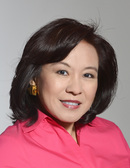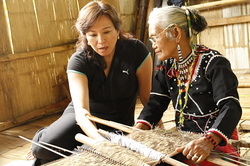
- Interviewee: Jeannie Javelosa
- Region: Philippines / Southeast Asia
- Organization: ECHOstore – ECHOsi Foundation
- Category: Retail of eco-friendly, artisan, fair trade products, Product Development and market access for small producers
Jeannie Javelosa is the co-founder of the green retailer and social enterprise ECHOstore Sustainable Lifestyle (ECHO-Environment Community Hope Organization) and President of its non-profit arm ECHOsi (ECHO-Empowering Communities with Hope and Opportunities through Sustainable Initiatives) Foundation. She is also an awarded-book author-artist-designer, museum curator, writer, and international speaker who advocates for sustainability and culture. In 2012, Jeannie was the Cartier Women’s Award Finalist from Asia and invited to be a member of the World Entrepreneur Forum. She is founding president of the Business and Professional Women (BPW) in Makati, Philippines.
Her social enterprise ECHOstore is a tri-concept including a store, café and market that sells fair trade, green, organic, artisan-made products (both food and non-food). The non-profit ECHOsi handles the development work all over the country, including product development, design and packaging intervention, preparing artisan products for market readiness through financial literacy, checking the sustainability of their production processes, branding and market access. They work with micro-entrepreneurs and farmer groups. Through ECHOsi, she is private sector co-architect for the GREAT Woman Platform–a unique integral and inclusive model of development and market access which ECHOsi has put together. It is now the gender platform for the Philippines. The GW Platform is a convergence of national and local government agencies, women’s groups resulting in improving local business policy, projects and services for women businesses. GREAT Women also known as “Gender Responsive Economic Actions for the Transformation of Women” addresses gender issues in both micro and social enterprise development. The goal is to help women up the supply and value chain. The focus is presently on food and textile weaving. The GW Platform is being studied for replication in APEC economies and ASEAN countries.
I graduated with a Masters Degree in Painting from the University of Pennsylvania, USA. The first part of my professional life was expressing the entrepreneurial and creative side as a painter with 20 solo shows, printmaker, curator, writer-book author with awards for certain books. Then, with a business partner, I set up a communications agency which morphed into a stakeholder relations firm. It is now 15 years old. But the real entrepreneurial experience I would like to highlight is that of being a social entrepreneur when I set up ECHOstore Sustainable Lifestyle with two of my friends.
Tell us about ECHOstore-ECHOsi Foundation
We wanted to do business that would make us grow old gracefully, something we could enjoy, and could use our combines skills, talents and network. We looked at the gap and realized nobody was helping the poor producers sell their products, and no one was talking about the sustainable green lifestyle. So bringing our unique expertise together that included retail, branding, marketing, design, product development, and communications, we set up ECHOstore. We pioneered the first green store in a high-end retail space. Within a year, we needed to set-up a non-profit arm because we did not want to confuse retail with development work. So ECHOsi Foundation was born to handle all the development programs. Store-Foundation are linked in that what we help develop and produce, we market test and bring to various markets (mall, e-commerce, export to international)
At the core of everything we do is about Sustainability - production, consumption and lifestyle. It is about checking the supply and value chain of the lifestyle products we sell, from the bottom of the pyramid of how the material is planted by the farmers, to the small micro producers, all the way to international markets.
- How did you come up with the idea?
- What are you specifically doing?
- What’s your impact?
Approximate metrics at present include: the licensing and expansion of ECHOstore into 5 stores (and more) and expanding sales, an e-commerce site, and international export presence which allows for consumer impact and expansion. To date, store-foundation has helped 100 organizations and foundations, close to 80,000 beneficiaries, managed the development of so many new products that are being market tested or now are being sold.
In 2013, under the GREAT Women program alone, the ECHOsi Foundation posted an impact reach of approximately 500 women, with around 900 additional beneficiaries through cascade workshops, impacting 28,500 women (women x 5 family members x direct impacts of women neighbor) and household members.

ECHOstore is the social enterprise firmly rooted in business, and as deeply rooted in the values it espouses: Care for the self, the community and the environment. The Foundation, which is the non-profit must also be firmly rooted in sustainable ways of continuing its programs to support itself. I believe the future of social entrepreneurship is the ability to balance both profit, development, values and sustainability for all.
Social entrepreneurship is using entrepreneurial skills and abilities towards businesses or programs that bring about social good and impact. Yes I see myself as a social entrepreneur. I don't think I can even just call myself “an entrepreneur” because all my endeavors now have social issues that include poverty alleviation, care for environment and even cultural tradition and heritage preservation.
How do you see the concept of social entrepreneurship in different contexts? More specifically, how does it differ between developing and developed economies? Is there something like social entrepreneurship in the informal sector or do those entrepreneurs focus exclusively on the classic moneymaking business?
In developing countries, social entrepreneurship is young and lack the support structures and mechanism. When we started ECHOstore five years ago, we were one of a few social entrepreneurs. Today, so many start-ups are looking at social causes but whether their enterprises would prosper also as a business must remain to be seen. There must be the heart and business savvy linked together.
In the informal sector, most directions are to survive, therefore money-making initiatives are key. Into this sector, we are trying to teach the idea of sustainability and greening the value chain.
Do you have a role model? If so who and why?
- Economically empowering women through Market Access: I think in the USA, it would be the Full Circle Exchange of the Priddy Brothers. It is similar to what we are trying to do at ECHOstore–but they are bringing products of women from the bottom of the pyramid to Walmart all across the US –which is a fantastically large customer base!
- For inspirationally motivating the Youth: Gawad Kalinga headed by Tony Meloto in the Philippines, for inspiring volunteerism in the youth to build homes for the poor.
- For Skills Training: Barefoot College of Bunker Roy, which started in India, for the audacity and unique idea of empowering grandmothers with skills within their communities.
- For Environmental Education: The Green School in Bali, Indonesia for creating an alternative way of educating the young about the environment and how to try to live sustainably.
What’s your advice for novice and future social entrepreneurs who want to make a difference in the world?
Know business even as you keep your heart on your sleeves for the causes and advocacies you wish to stand for. All endeavors will need funds, just as funds are available for good causes, programs and a customer base willing to spend on good products that support causes.
I believe we cannot do things alone. Find good collaborators and partners with shared values and whose professional skills can complement yours.
Find the gap and that which is missing, then try to create something to answer the gap, the need.
What is your next project?
- Under ECHOstore: license out more ECHOstore-café-markets around the country; begin exporting our products around the region specifically as the ASEAN economic integration is happening soon; begin pop-up stores for our sub-brand “Great Women” in the local market.
- Under the ECHOsi Foundation: To continue the second phase of the GREAT Women Platform specifically focused on the textiles of the cultural and indigenous peoples of the Philippines. The Philippine textile industry is also dead, so I am trying to see how we can help revive and strengthen natural fibers, dyes and design traditions and present this in lifestyle products that are natural and yet keep alive the spirit and story of our people. For food products, to find more unique Filipino ingredients and infuse more cultural designs and messages into them.

 RSS Feed
RSS Feed
